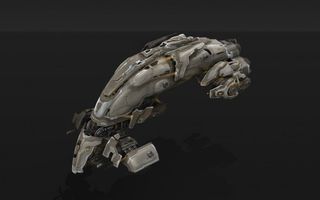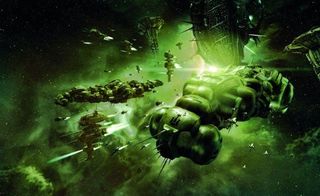The making of EVE Online
How Icelandic visionaries made the multiplayer space game and story generator a reality.
CCP's resident economist, Dr Eyjólfur Guðmundsson, sees the arrival of the Goonswarm alliance from somethingawful.com's forum as one of the biggest surprises. Traditionally deployed into an MMO to break the game, the Goons used EVE's loose boundaries to develop new combat techniques. “I remember when they came in and started to attack large capital ships with swarms of low-level players. It was ingenious, and it showed us that the fundamental design of EVE was still functional.” The Goons' rise to a kind of chaotic power was a late-stage proof of concept, showing the rules of the universe hadn't crystallised around a set way to play.
Sean Conover, before he worked at CCP, was better known as Darius Johnson. He's now known as 'Sean Conover who is also Darius Johnson'. As his internet alter-ego, he led the Goons for a year between 2008 and 2009. In February 2009, he was present along with a handful of associates at the defection of the director of one of EVE's oldest alliances: Band of Brothers. He smirks as he recounts the story—and he's got every right to do so, using underhand tactics, negotiation skills and a flair for offensive tirades to achieve his aims.

The alliance he headed up set about EVE with the hyperactive ridiculousness unique to an army of bored forum kids. In doing so, they carved a niche of internet history. Torfi expands on the idea internet fame. “With other games, you might be the hero of your server, known to 30,000 people; in EVE you're making an impact on all those players' lives in-game. I remember when playing years ago, there was a pilot who was famous for killing everyone. I was mightily starstruck when he podded me.”
Funny money
This fame comes with a price. In June 2006, a CCP employee used their position to obtain a set of blueprints that constituted an unfair advantage for their chosen alliance. Reynir recounts the experience as one of CCP's biggest mistakes to date. “It was such a minor thing, but the rule is, do not cheat. Players were super-concerned because we did not fire him on the spot, and that was probably a mistake in hindsight.” EVE's utterly balanced economy—where everything is mined, manufactured and sold by the players—means that injecting outside sources into the production stream has repercussions potentially universe-wide.
I push for more mistakes, probing the cracks in the foundation of the company. Other developers might paper over the missteps, but Reynir grins a grin that means, 'How long have you got?' “At one point, we released a patch that sent people's computers to the blue screen of death. We accidentally destroyed like 2,000 computers. The players were actually okay about it, strangely.” Along the route, he makes it clear there were coding bodges and bad decisions, but these are technicalities. I ask for major catastrophes. “We haven't really had any,” he says, pondering. He sounds quietly amazed.

At the edge of the world, the new universe is coming along nicely. EVE is old enough to have its own legends, its own founder mythology. Give it a few years and it'll have its epic poetry and its own social constructs. Give it 20 and it'll become home like Iceland did to those insane enough to set sail in a boat for a landmass they'd only imagined.
EVE's an electronic landmass, more ethereal than the volcanic gob of rock in the north Atlantic it sprung from. But it's not going anywhere soon. After all, it took Ingólfr Arnarson 1,100 years to convince 300,000 people to live in his world; EVE managed that feat in only seven.
The biggest gaming news, reviews and hardware deals
Keep up to date with the most important stories and the best deals, as picked by the PC Gamer team.
Most Popular


